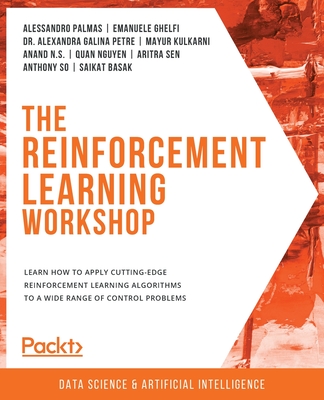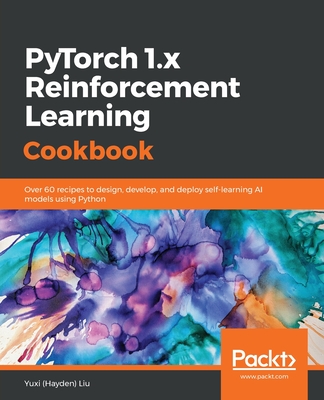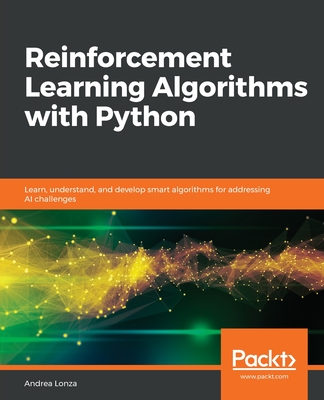The Reinforcement Learning Workshop: Learn how to apply cutting-edge reinforcement learning algorithms to a wide range of control problems
暫譯: 強化學習工作坊:學習如何將尖端的強化學習演算法應用於各種控制問題
Palmas, Alessandro, Ghelfi, Emanuele, Petre, Alexandra Galina
- 出版商: Packt Publishing
- 出版日期: 2020-08-14
- 售價: $1,880
- 貴賓價: 9.5 折 $1,786
- 語言: 英文
- 頁數: 822
- 裝訂: Quality Paper - also called trade paper
- ISBN: 1800200455
- ISBN-13: 9781800200456
-
相關分類:
Reinforcement
海外代購書籍(需單獨結帳)
相關主題
商品描述
Start with the basics of reinforcement learning and explore deep learning concepts such as deep Q-learning, deep recurrent Q-networks, and policy-based methods with this practical guide
Key Features
- Use TensorFlow to write reinforcement learning agents for performing challenging tasks
- Learn how to solve finite Markov decision problems
- Train models to understand popular video games like Breakout
Book Description
Various intelligent applications such as video games, inventory management software, warehouse robots, and translation tools use reinforcement learning (RL) to make decisions and perform actions that maximize the probability of the desired outcome. This book will help you to get to grips with the techniques and the algorithms for implementing RL in your machine learning models.
Starting with an introduction to RL, you'll be guided through different RL environments and frameworks. You'll learn how to implement your own custom environments and use OpenAI baselines to run RL algorithms. Once you've explored classic RL techniques such as Dynamic Programming, Monte Carlo, and TD Learning, you'll understand when to apply the different deep learning methods in RL and advance to deep Q-learning. The book will even help you understand the different stages of machine-based problem-solving by using DARQN on a popular video game Breakout. Finally, you'll find out when to use a policy-based method to tackle an RL problem.
By the end of The Reinforcement Learning Workshop, you'll be equipped with the knowledge and skills needed to solve challenging problems using reinforcement learning.
What you will learn
- Use OpenAI Gym as a framework to implement RL environments
- Find out how to define and implement reward function
- Explore Markov chain, Markov decision process, and the Bellman equation
- Distinguish between Dynamic Programming, Monte Carlo, and Temporal Difference Learning
- Understand the multi-armed bandit problem and explore various strategies to solve it
- Build a deep Q model network for playing the video game Breakout
Who this book is for
If you are a data scientist, machine learning enthusiast, or a Python developer who wants to learn basic to advanced deep reinforcement learning algorithms, this workshop is for you. A basic understanding of the Python language is necessary.
商品描述(中文翻譯)
**從強化學習的基本概念開始,並透過這本實用指南探索深度學習概念,如深度 Q 學習、深度遞迴 Q 網絡和基於策略的方法**
#### 主要特點
- 使用 TensorFlow 編寫強化學習代理,以執行具有挑戰性的任務
- 學習如何解決有限的馬可夫決策問題
- 訓練模型以理解像 Breakout 這樣的熱門視頻遊戲
#### 書籍描述
各種智能應用程序,如視頻遊戲、庫存管理軟件、倉庫機器人和翻譯工具,使用強化學習(RL)來做出決策並執行行動,以最大化所需結果的概率。本書將幫助您掌握在機器學習模型中實現 RL 的技術和算法。
從強化學習的介紹開始,您將被引導通過不同的 RL 環境和框架。您將學習如何實現自己的自定義環境並使用 OpenAI baselines 來運行 RL 算法。一旦您探索了經典的 RL 技術,如動態規劃、蒙特卡羅和時間差學習,您將了解何時在 RL 中應用不同的深度學習方法,並進一步學習深度 Q 學習。本書甚至將幫助您通過在熱門視頻遊戲 Breakout 上使用 DARQN 來理解基於機器的問題解決的不同階段。最後,您將了解何時使用基於策略的方法來解決 RL 問題。
在《強化學習工作坊》結束時,您將具備使用強化學習解決挑戰性問題所需的知識和技能。
#### 您將學到什麼
- 使用 OpenAI Gym 作為框架來實現 RL 環境
- 瞭解如何定義和實現獎勵函數
- 探索馬可夫鏈、馬可夫決策過程和貝爾曼方程
- 區分動態規劃、蒙特卡羅和時間差學習
- 理解多臂賭徒問題並探索各種解決策略
- 建立一個深度 Q 模型網絡來玩視頻遊戲 Breakout
#### 本書適合誰
如果您是數據科學家、機器學習愛好者或希望學習從基本到進階的深度強化學習算法的 Python 開發者,這個工作坊適合您。需要對 Python 語言有基本的理解。
作者簡介
Alessandro Palmas is an aerospace engineer with more than 7 years of proven expertise in software development for advanced scientific applications and complex software systems. His main ML focus is on computer vision, 3D models, volumetric networks, and deep reinforcement learning. He also founded innovative initiatives, his last being Artificial Twin, which provides advanced technologies for machine learning, physical modeling, and computational geometry applications. Two key areas in which current Artificial Twin deep RL work is focused on are video games entertainment, and guidance, navigation & control systems.
Emanuele Ghelfi is a computer science and machine learning engineer. He received an M.Sc. degree in computer science and engineering at Politecnico di Milano in December 2018. In his thesis, he proposed a new RL algorithm for an MDP extension. The paper from the thesis got accepted at ICML 2019.
Dr. Alexandra Galina Petre is a machine learning and data science expert, currently leading and teaching various engineering modules in Coventry, United Kingdom. She received her Ph.D. in user feedback-based reinforcement learning for vehicle comfort control with a focus on revolutionary heating ventilation and air conditioning SARSA-based control systems that can learn from the driver's preferential changes to the UI.
Mayur Kulkarni works in the Machine Learning research team at Microsoft and has previously been at IIT Bombay, and IIM Lucknow. He has also been an instructor for the postgraduate programs in Artificial Intelligence and Machine Learning at UpGrad and IIIT Bangalore, covering topics in Deep Reinforcement Learning. He is one of the contributors to DVC, torch, and scikit-learn, which are some of the most popular open-source machine learning libraries in Python.
Anand N.S. has more than two decades of technology experience working, with a strong hands-on track record of application of artificial intelligence, machine learning, and data science to create measurable business outcomes. He has been granted several US patents in the areas of data science, machine learning, and artificial Intelligence.
Quan Nguyen is a programmer with a special interest in scientific computing, data analysis, and artificial intelligence. Before publishing his first book with Packt, he was a primary contributor to the book Python for Scientists and Engineers and various open-source projects on GitHub. He is also a writer for the Python Software Foundation and Oracle's AI and Data Science blog.
Aritra Sen currently works as a data scientist in Ericsson. His current role includes building and deploying large scale machine learning solutions for the telecom industry. He has around 10 years of experience in data science and business intelligence.
Anthony So is an outstanding leader with more than 13 years of experience. He is recognized for his analytical skills and data-driven approach for solving complex business problems and driving performance improvements. He is also a successful coach and mentor with capabilities in statistical analysis and expertise in machine learning with Python.
Saikat Basak is a data scientist and a passionate programmer. Having worked with multiple industry leaders, he has a good understanding of problem areas that can potentially be solved using data. Apart from being a data guy, he is also a science geek and loves to explore new ideas in the frontiers of science and technology.
作者簡介(中文翻譯)
阿萊桑德羅·帕爾馬斯是一位航空航天工程師,擁有超過7年的軟體開發經驗,專注於先進科學應用和複雜軟體系統。他的主要機器學習(ML)重點在於計算機視覺、3D模型、體積網絡和深度強化學習。他還創立了創新計畫,最近的一個是人工雙胞胎(Artificial Twin),該計畫提供機器學習、物理建模和計算幾何應用的先進技術。目前人工雙胞胎的深度強化學習工作主要集中在視頻遊戲娛樂以及導航、引導與控制系統兩個關鍵領域。
埃馬努埃萊·蓋爾菲是一位計算機科學和機器學習工程師。他於2018年12月在米蘭理工大學獲得計算機科學與工程碩士學位。在他的論文中,他提出了一種新的強化學習(RL)算法,用於馬爾可夫決策過程(MDP)的擴展。該論文在2019年被國際機器學習會議(ICML)接受。
亞歷山德拉·加利娜·佩特雷博士是一位機器學習和數據科學專家,目前在英國考文垂領導和教授各種工程模塊。她獲得了博士學位,研究基於用戶反饋的強化學習,用於車輛舒適控制,專注於革命性的加熱通風和空調(HVAC)基於SARSA的控制系統,這些系統能夠從駕駛者對用戶界面的偏好變化中學習。
馬尤爾·庫爾卡尼在微軟的機器學習研究團隊工作,之前曾在印度理工學院孟買(IIT Bombay)和印度管理學院勒克瑙(IIM Lucknow)任職。他還曾擔任UpGrad和印度信息技術學院班加羅爾(IIIT Bangalore)人工智慧和機器學習研究生課程的講師,涵蓋深度強化學習的主題。他是DVC、torch和scikit-learn的貢獻者,這些都是Python中最受歡迎的開源機器學習庫。
阿南德·N.S.擁有超過二十年的技術經驗,擁有強大的實踐記錄,將人工智慧、機器學習和數據科學應用於創造可衡量的商業成果。他在數據科學、機器學習和人工智慧領域獲得了多項美國專利。
全·阮是一位程序員,對科學計算、數據分析和人工智慧有特別的興趣。在與Packt出版他的第一本書之前,他是《Python for Scientists and Engineers》一書的主要貢獻者,並參與了多個GitHub上的開源項目。他也是Python軟體基金會和Oracle的AI與數據科學博客的撰稿人。
阿里特拉·森目前在愛立信擔任數據科學家。他的當前角色包括為電信行業構建和部署大規模的機器學習解決方案。他在數據科學和商業智慧方面擁有約10年的經驗。
安東尼·蘇是一位出色的領導者,擁有超過13年的經驗。他因其分析能力和數據驅動的方法而受到認可,能夠解決複雜的商業問題並推動績效改進。他也是一位成功的教練和導師,擁有統計分析的能力和Python機器學習的專業知識。
賽卡特·巴薩克是一位數據科學家和熱情的程序員。他曾與多家行業領導者合作,對可以利用數據解決的問題領域有良好的理解。除了是一名數據專家外,他還是一位科學迷,喜歡探索科學和技術前沿的新想法。
目錄大綱
- Introduction to Reinforcement Learning
- Markov Decision Processes and Bellman Equations
- Deep Learning in Practice with TensorFlow 2
- Getting Started with OpenAI and TensorFlow for Reinforcement Learning
- Dynamic Programming
- Monte Carlo Methods
- Temporal Difference Learning
- The Multi-Armed Bandit Problem
- What Is Deep Q Learning?
- Playing an Atari Game with Deep Recurrent Q Networks
- Policy-Based Methods for Reinforcement Learning
- Evolutionary Strategies for RL
目錄大綱(中文翻譯)
- Introduction to Reinforcement Learning
- Markov Decision Processes and Bellman Equations
- Deep Learning in Practice with TensorFlow 2
- Getting Started with OpenAI and TensorFlow for Reinforcement Learning
- Dynamic Programming
- Monte Carlo Methods
- Temporal Difference Learning
- The Multi-Armed Bandit Problem
- What Is Deep Q Learning?
- Playing an Atari Game with Deep Recurrent Q Networks
- Policy-Based Methods for Reinforcement Learning
- Evolutionary Strategies for RL












